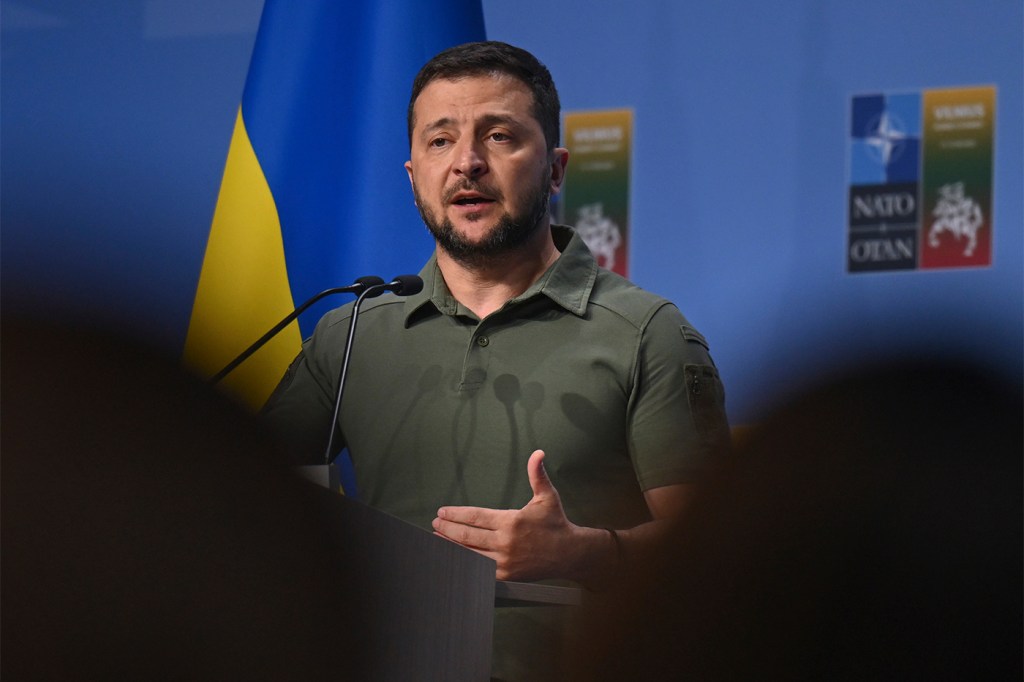NATO rides the wave of unprecedented unity while being careful to not cross a political line with Russia

The North Atlantic Treaty Organization’s annual summit in Vilnius, Lithuania, demonstrated unprecedented unity among its members, as well as its reluctance to cross a political line with Russia in its war on Ukraine, a Northeastern University expert says.
“It would be very unwise to allow Ukraine to enter [NATO] knowing that it would immediately change how NATO is playing a role in this conflict,” says Julie Garey, associate teaching professor of political science and director of Northeastern’s Security and Resilience Studies program.
Turkey President Recep Tayyip Erdogan, who had previously blocked Sweden from joining the alliance, sprang the biggest surprise of the summit by agreeing to accept the Scandinavian country’s bid for membership and forward it to the Turkish parliament for ratification.
Northeastern Global News spoke with Garey about her takeaways from the summit. Her comments have been edited for brevity and clarity.
How would you describe the results of the NATO summit in Lithuania?

I think that there were some things that came out in the Vilnius summit communiqué that were certainly expected. A lot of the official tactics and some of the things that were said in the speeches were building on initiatives that have been in place for a short period of time (maybe since 2021 or 2022) while some initiatives, like the strategic goals of the alliance, have been in place long term. There were also some successes in some of the newer initiatives around Ukraine and the discussions around Sweden’s membership that were really substantial. There is still some unprecedented unity in the alliance, and the allies are taking advantage of that by accomplishing some of the goals it has set out to accomplish—namely, defense spending and contribution of military equipment and other resources for the alliance to use in the coming years.
Besides getting the U.S. to agree to sell Turkey American F-16 fighter jets, why do you think Erdogan changed his mind and agreed to give his approval right before the summit?
There are a couple of different events leading to this decision that I could hypothesize about. Turkey’s now gone through the elections, which were not a guaranteed outcome for Erdogan. Now that that has passed, he’s thinking about the future and putting that in the rearview mirror.
Sweden also has made a number of the changes that Turkey requested in terms of its efforts to fight terrorism and treatment of the Kurdistan Workers’ Party, or the PKK. Turkey and many other NATO allies see PKK as a terrorist or criminal organization.
In addition, looking at Turkey’s relationships with all of the other allies and particularly the United States on the eve of the summit probably helped to further persuade him and to bring Erdogan closer to going to parliament.
The U.S. sees making a deal with Turkey on fighter jets as benefiting Turkey, yes, but it’s benefiting the alliance as a whole. It’s benefiting military capabilities and political cohesion. This is a good thing for us, as well as a good thing to bring Sweden into NATO.
What do you think about the framework NATO and the Group of Seven industrialized democracies offered Ukraine instead of the membership (new NATO-Ukraine council consultations, security assurances, modern military equipment, training for Ukrainian forces, intelligence)? Do you think NATO will accept Ukraine as soon as the war ends?
I don’t think anyone should be surprised that Ukraine is pushing very hard for NATO membership, but I also don’t think that anyone should be surprised that NATO allies are pushing back and saying no, not yet.
NATO’s Article 5 does obligate the alliance to transition its behavior in the event that Ukraine becomes a member and is actively at war. And because of that, many states, the U.S. included, have said that it would be very unwise to allow Ukraine to enter knowing that it would immediately change how NATO is playing a role in this conflict.
As national security adviser Jake Sullivan said, if it were another state that had the same relationship with the alliance, NATO would be saying the same thing.
What people often forget though is that the individual NATO allies can increase support [for Ukraine] or decrease it as they see fit. Ukraine doesn’t need to be a member of NATO to get NATO support or to have NATO allies support it.
I do think it’s a sincere commitment to Ukraine to put them on a path to membership. The allies individually and the alliance as a whole have made a lot of efforts to support Ukraine. It is also intended to withstand after the war as long as Ukraine remains a willing and an able participant and continues making progress towards military, political, and economic goals that the alliance sets out for it.
NATO has been very careful about the kinds of resources it’s providing versus the individual allies, because it doesn’t want to exacerbate tensions and it doesn’t want to be at war with Russia. It understands that that would be crossing, at minimum, a political line with Russia, and it’s concerned about the consequences of that.
NATO doesn’t want Russia to think that this strategy of who can or can’t be a member or how the alliance is going to respond is successful in shaping the future of the alliance. At the same time, it does not want to provoke additional aggression towards Ukraine.
Another big takeaway from the summit was that NATO has adopted new, improved deterrence and defense plans. Why did it take a year and a half for NATO to update its defense plans after the war in Ukraine broke out?
If we’re talking about the Strategic Concept, I think that the 2022 invasion of Ukraine certainly prompted additional pressure to really refine that document. The Strategic Concept, though, came out in June 2022.
The alliance has produced a new strategic concept about every decade since 1991, because it looks at the biggest picture and at the changing geopolitical landscape. If you have an incremental change year after year, there’s maybe not so much need to update that. It’s only once you are at this point of a really monumental shift, the alliance really needs to reassess what it’s doing and where it’s going.
Russia’s invasion of Ukraine made some of the allies realize that even when the war comes to an end, there are still going to be these vulnerabilities, these threats. They need to have the resources in place.
The NATO Response Force had never really been deployed in full force before 2022. They deployed tens of thousands of troops and equipment. They were planning for all these different kinds of operations to help with securing the border of NATO allies, to help with humanitarian relief, to help with defense, if the war were to spill over into NATO territory. So, they’re learning what the alliance’s needs are as well as adapting to what’s happening in Ukraine and Russia and perhaps adapting to some of these longer-term goals the alliance is setting for itself.
The members also pledged to spend at least 2% of their gross domestic product on their national military budgets and at least 20% of that amount on new military equipment, research and development. Some analysts pointed out that there is no schedule or timetable of when each ally needs to meet these targets. How problematic do you think it is?
There are several problems with that, not the least of which is there is no real enforcement mechanism or significant consequence to an ally for not meeting that.
But I personally would push back just a little against some of that criticism. There are allies like the U.S. who understand that they’re asking a lot, that they maybe have the capability to spend more than the 2% (and that that’s a more significant amount in dollars) than a state with a smaller economy.
There’s also a recognition that there’s a lot to be gained from having these states in the alliance and having them contribute what they are capable of contributing, while also putting some pressure on them to contribute more.
There are states that actually house the resources under NATO control. These states have given NATO the rights to use the land or to use the waterways or have access to airfields which is really important. There are some advantages to, for example, having states who are particularly skilled with humanitarian relief or disaster relief; states like Estonia who faced some pretty significant cyber-attacks in the late 2000s. Being willing to share that expertise, the intelligence, all of the things that they’re working on in that area to the alliance is really valuable.
Alena Kuzub is a Northeastern Global News reporter. Email her at a.kuzub@northeastern.edu. Follow her on Twitter @AlenaKuzub.






